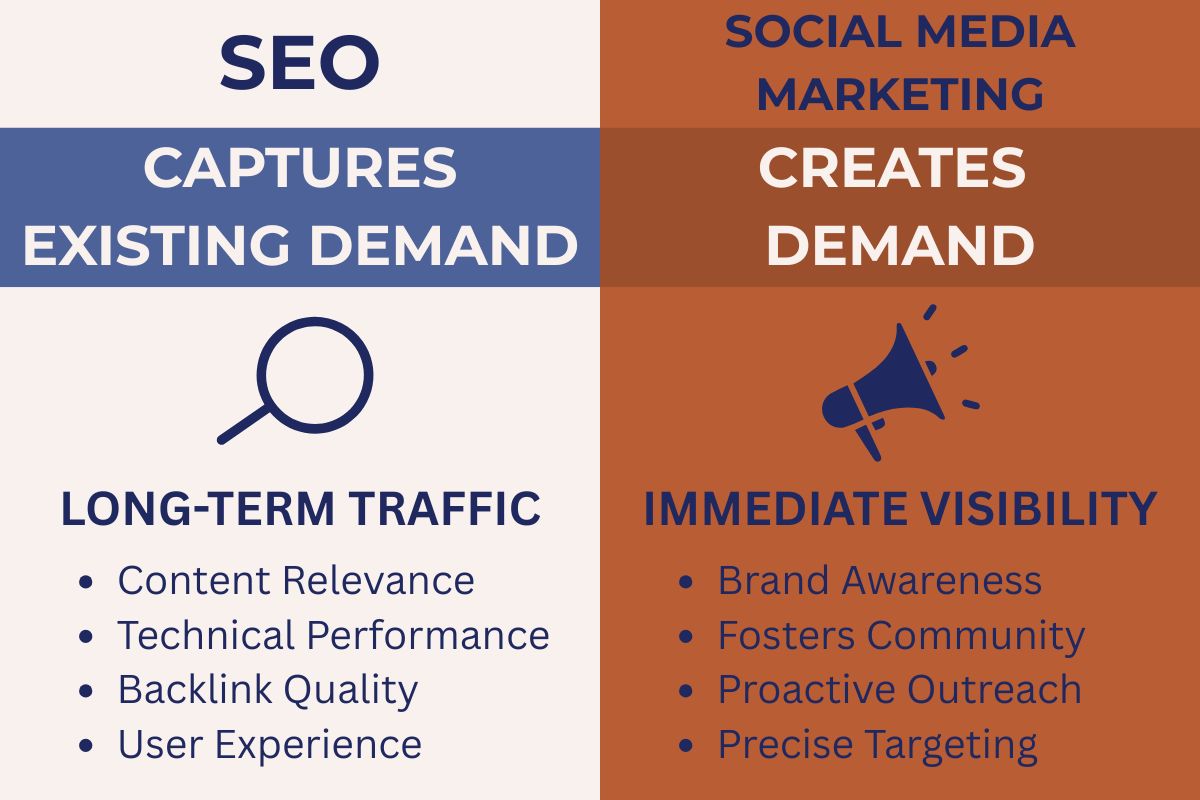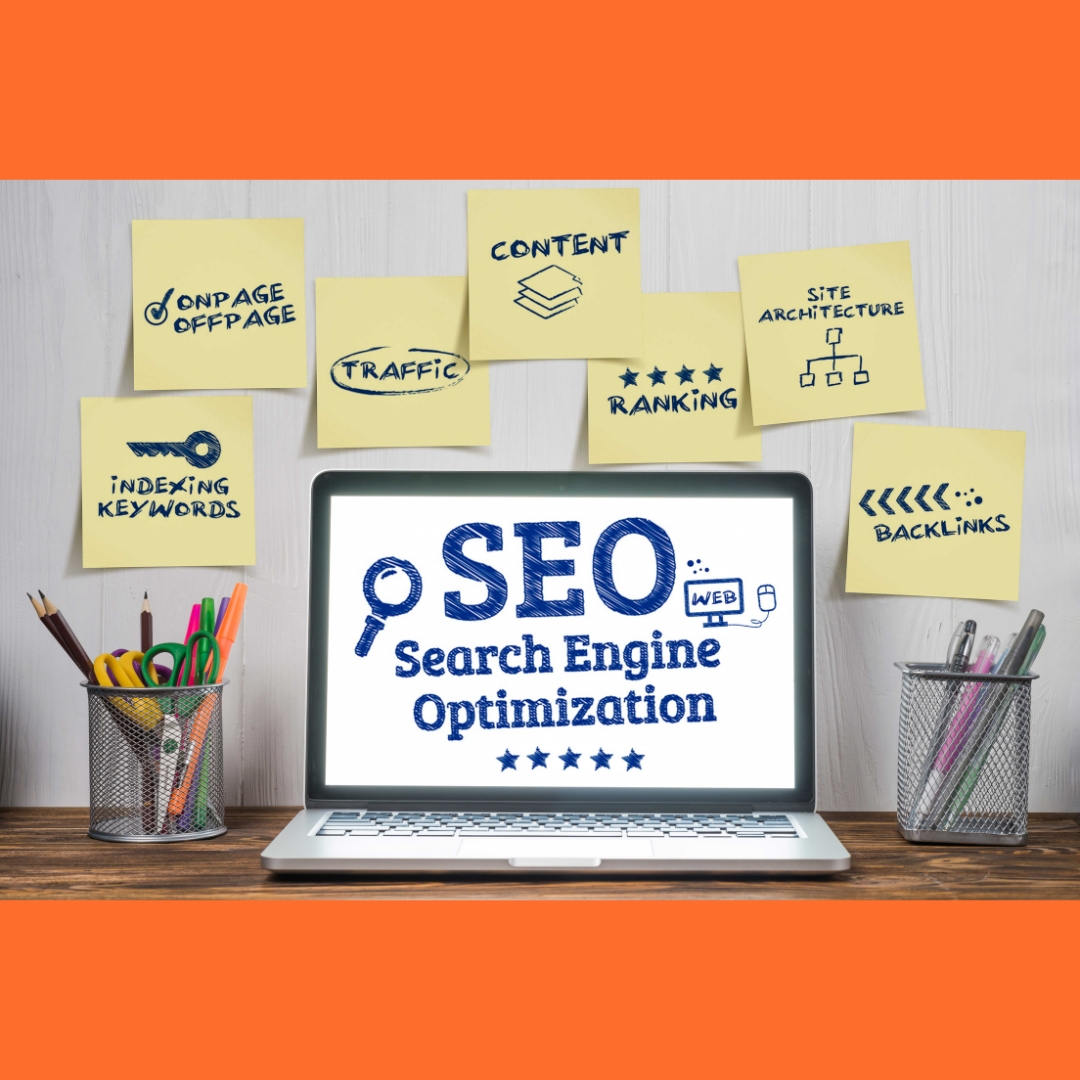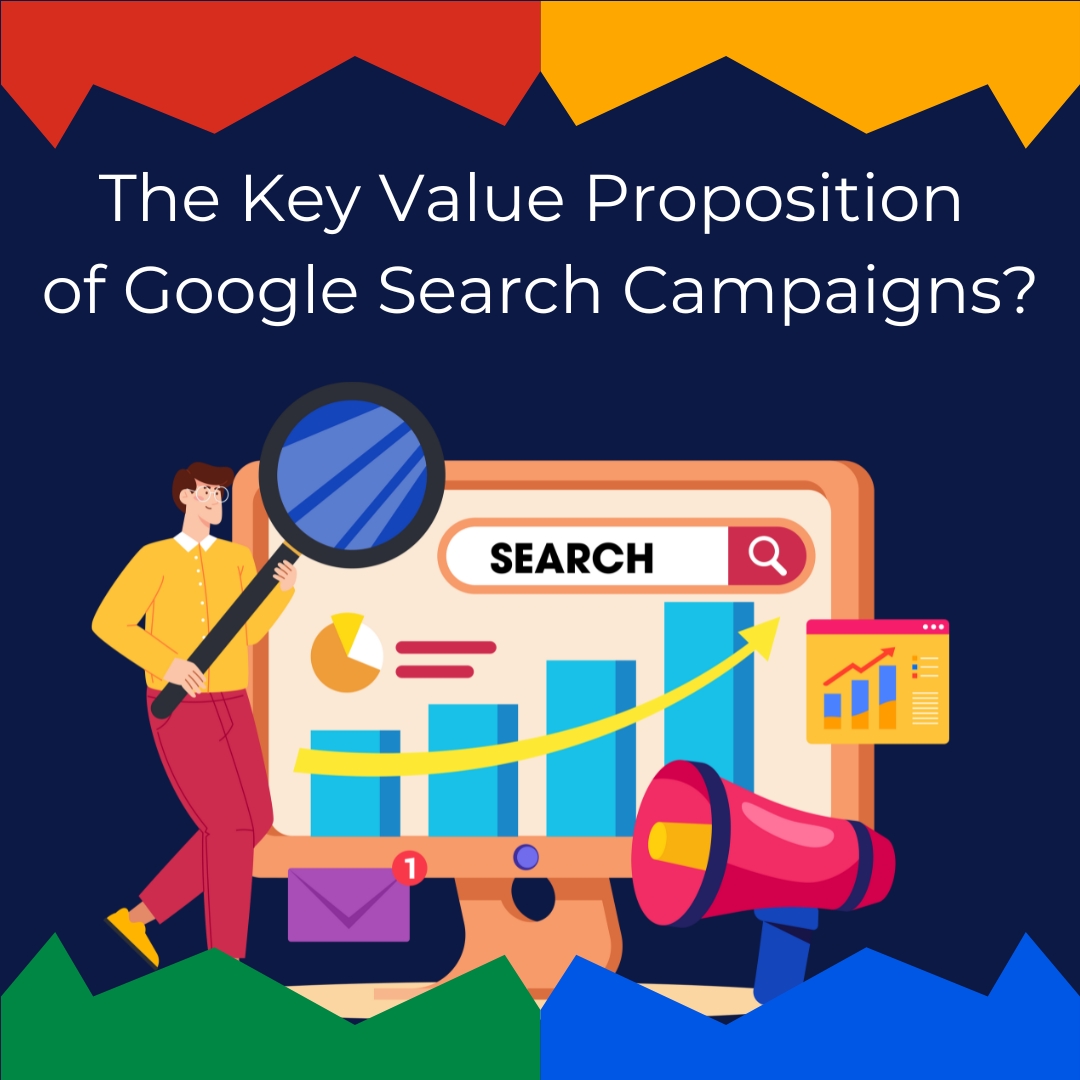About 68% 68% of online experiences begin with a search engine, yet social media now influences over 71% of consumer purchasing decisions.
This data highlights the critical tension in the SEO vs social media marketing debate that e-commerce businesses face daily.
While search engines drive traffic with clear purchase intent, social platforms excel at building brand relationships that convert over time.
Each channel operates on fundamentally different principles – SEO captures existing demand through search engine positions, while social media creates new demand through visibility and engagement.
For store owners with limited resources, knowing how to strategically balance these channels rather than choosing just one can mean the difference between growing and just getting by in today’s competitive digital landscape.
The Fundamental Difference Between SEO and Social Media Marketing
The difference between SEO and social media marketing starts with how people find your content.
SEO (Search Engine Optimization) focuses on capturing existing demand – people actively searching for solutions to specific problems.
Social media marketing, on the other hand, creates demand by putting your brand in front of people who weren’t necessarily looking for it.

SEO: The Long-Term Traffic Engine
SEO depends on understanding and optimizing for SEO ranking factors that search engines use to determine your site’s position in search results. These include:
- Content relevance and depth
- Website technical performance
- Backlink quality and quantity
- User experience signals
When implemented effectively, SEO offers a sustainable traffic source that continues delivering visitors long after the initial optimization work. The most substantial advantage is intent – people who find you through search engines are actively looking for what you offer.
Social Media: The Visibility Accelerator
Social media platforms excel at building brand awareness and growing a community. Unlike SEO’s reactive nature, social media allows for proactive outreach to potential customers.
Getting quick results is one of its greatest strengths – a well-crafted campaign can generate significant traffic within hours.
Social platforms also offer precise targeting capabilities that SEO cannot match. You can reach specific demographics, interests, and behaviors with remarkable accuracy.
Which is Better: SEO or Social Media Marketing?
The question of which one of SEO or social media is a better marketing tool has no one-size-fits-all answer. Your optimal approach depends on several factors:
Business Model Considerations
For dropshipping and e-commerce businesses, SEO often delivers better ROI for product-specific searches.
When someone searches “best wireless headphones under $100,” they’re demonstrating clear purchase intent that SEO can capture.
Social media marketing shines for businesses with visually appealing products, strong brand identity, or community-oriented offerings. Fashion, home décor, and lifestyle brands typically perform exceptionally well on platforms like Instagram and Pinterest.
Resource Requirements
SEO demands significant upfront investment in content creation, technical optimization, and link building.
Results typically take 3-6 months to materialize, but once rankings are established, they often maintain with minimal ongoing effort.
Social media requires consistent content production and community management. While you can see immediate traffic spikes, engagement quickly fades without regular posting. This makes social media more labor-intensive for sustainable results.
Traffic Quality Analysis
When comparing social media marketing vs. SEO, traffic quality often differs substantially:
- SEO traffic generally has higher conversion rates because users are specifically searching for solutions that your products provide.
- Social media traffic typically has lower immediate purchase intent but offers better brand-building and remarketing opportunities.
How to Determine the Right Mix for Your Business
Deciding on SEO vs social media in terms of which one is best for your marketing requires analyzing your specific business context:
Audit Your Current Performance
Before allocating resources, examine your existing traffic sources:
- Which channels currently drive the most visitors?
- Which channels convert better into sales?
- Where do your most profitable customers come from?
This baseline data provides crucial insight into where you should focus future efforts.
Analyze Your Competition
Study competitors to understand their traffic strategy. Tools like Ahrefs and SEMrush can reveal:
- Which keywords do competitors rank for
- Their social engagement metrics
- Traffic distribution across channels
Often, you’ll discover untapped opportunities where competitors are underperforming.

Consider Your Product Lifecycle
For new product launches, social media typically delivers faster visibility. Established products with specific search demand often benefit more from search engine positioning efforts.
The ideal approach evolves throughout your product lifecycle:
- Launch phase: Heavier social media focus for awareness
- Growth phase: Balanced approach leveraging both channels
- Maturity phase: Increased SEO investment for sustainable traffic
Maximizing the Benefits of Both Social Media and SEO in Marketing
Smart e-commerce operators recognize the benefits of both SEO and social media in the marketing world and implement strategies that allow these channels to complement each other.
Content Synergy Strategy
Create cornerstone content for your website that addresses high-value search queries. Then, repurpose this content into multiple social media formats:
- Transform how-to guides into Instagram carousel posts
- Convert product comparisons into YouTube videos
- Distill key insights into Twitter threads
This approach maximizes content ROI while maintaining consistent messaging across channels.
Cross-Channel Amplification
Use social media to boost SEO efforts by:
- Promoting new content to generate initial traffic signals
- Building relationships that lead to natural backlinks
- Increasing content sharing and visibility
In the meantime, use SEO to improve social performance by:
- Researching keywords for social hashtag strategies
- Identifying trending topics for timely social content
- Understanding audience questions to address in social posts
Pro Tip: The Hidden Traffic Multiplier
Here’s an expert insight most marketers miss: the power of platform-specific search optimization.

While most focus solely on Google, significant search volume exists within social platforms themselves. YouTube processes over 3 billion searches monthly, while Pinterest handles over 5 billion searches.
Optimize your social content for platform-specific search by:
- Using keyword-rich captions on Instagram
- Creating Pinterest pins with search-friendly descriptions
- Optimizing YouTube videos with targeted titles and descriptions
This approach to the SEO vs social media debate essentially turns social platforms into additional search engines, capturing traffic from both worlds.
Frequently Asked Questions
How long does it take to see results from SEO in comparison to social media marketing?
Social media marketing typically produces faster results, with campaigns generating traffic within hours or days of launching. SEO is a longer-term investment, usually requiring 3-6 months before significant traffic improvements appear.
The advantage of SEO is that once established, rankings often maintain with less ongoing effort than social media demands.
What’s the typical ROI comparison between SEO and social media?
SEO generally delivers higher long-term ROI due to its evergreen nature and higher conversion rates from search intent. Social media often has higher initial costs but can provide better brand-building and customer relationship benefits. For most successful e-commerce businesses, the highest ROI comes from using both channels together strategically.
Is paid social media more effective than organic social reach?
With organic reach declining across most platforms, paid social media has become essential for meaningful visibility. Organic social remains important for community building and customer retention, but new customer acquisition increasingly requires paid promotion.
The most effective approach combines targeted paid campaigns with consistent organic content.
How do mobile users affect the SEO vs social media decision?
Mobile users now account for over 60% of internet traffic, impacting both channels. For SEO, mobile-first indexing means that optimization for the mobile experience directly affects rankings.
On social platforms, mobile users typically engage more frequently but spend less time per session, requiring more concise, visually appealing content strategies.
How should local businesses allocate resources between SEO and social media?
Local businesses benefit significantly from local SEO efforts that capture “near me” searches with high purchase intent. Social media complements this by building community presence and highlighting location-specific promotions.
For most local businesses, allocating 60% to local SEO and 40% to targeted social media efforts on platforms where local customers engage proves most effective.
Can one person effectively manage both SEO and social media marketing?
For small businesses, one experienced digital marketer can manage basic SEO and social media efforts. However, as businesses scale, the technical depth required for advanced SEO and the creative demands of effective social media often require specialized roles.
Make the Strategic Choice for Your Business
When choosing between social media marketing vs. SEO, the most successful approach rarely involves picking just one. The real question isn’t which channel drives more traffic but rather which combination delivers the best results for your specific business.
Start by identifying your immediate needs – if cash flow is critical, focus initially on the channel most likely to deliver quick conversions. For most e-commerce businesses, this means beginning with some paid social to generate immediate visibility while simultaneously building SEO foundations for long-term growth.
Remember that traffic alone doesn’t equal success. The quality of visitors and their alignment with your business goals ultimately determine which channel deserves more of your resources. Regularly analyze performance data and be willing to adjust your strategy as your business evolves.
Finally, if you and your business are looking for expert guidance on creating this balanced approach, our team from Indexed Zone SEO is here to provide you with strategies that use the strengths of both channels for maximum growth.


